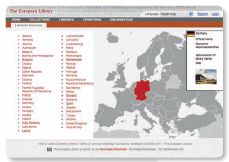Making knowledge accessible
Libraries have been around for a long time but technology has changed how we access them. Friedel Grant of The European Library looks at some of the things on offer from digital libraries and what the future will hold

The Library of Alexandria opened its doors around 2,300 years ago, with a mission to collect the entire world’s printed works in one place. When the library burned to the ground a few hundred years later, scholars estimate it may have held between 400,000 and 700,000 volumes – an impressive total for the age.
Fast-forward to current times and the amount of world culture accessible online is expanding at a rapid rate. Any collection with fewer than a million objects seems a very small total indeed for a modern digital library. Websites offering access to tens of millions of records from global memory institutions are now plentiful.
From our own office, we provide access to 200 million records from Europe’s national libraries via The European Library website, and our colleagues at Europeana link the public to 19 million objects from Europe’s museums, libraries, archives and audio-visual collections.
Our resources are constantly expanding, thanks to strong support from governments and institutions, as well as an ever-increasing demand from the academic sector for more online access to high-quality information.
One upcoming source of content is the Europeana Libraries project, which we are leading. It will make fi ve million digitised items from major European research libraries available to users of both The European Library and Europeana websites. The general public, meanwhile, can contribute to the world of digital culture through projects such as Europeana 1914-1918, which is creating an online archive of personal photographs, family memorabilia and documents from the First World War.
We’re not the only ones on a mission to make knowledge more accessible. WorldCat (1.5 billion library records), Trove (246 million records) and Google Books (over 15 million books), along with smaller projects such as Old Bailey Online are just a few examples among many of how the internet is giving access to vast swathes of records that were previously only available physically.
Many might say that lovers of culture and academic researchers have never had it so good: access to an unprecedented corpus of material and the ability to locate and capture millions of items from their own desks. And yet the future promises much more.
A key focus for the coming years will be on making records and digital items easier to find, from a single point of access. Too often, our cultural treasures are spread across multiple websites and providers, rather than integrated in a single database.
As an aggregator of library material across Europe, The European Library already takes the digital collections and bibliographic records of dozens of institutions and makes them accessible through one searchable database.
We are now working on a new portal that will allow researchers instantly to search and retrieve a wealth of full-text scholarly material, including nearly 600,000 books and e-theses. We will also make it easy for researchers to cite online items by implementing the ability to export data to reference management systems such as Mendeley and Zotero. In addition, we will sort objects into special collections and by discipline, so researchers can quickly locate items published in Europe in their subject area.
We will also be creating APIs (Application Programming Interfaces) so that our content can be easily embedded and shared beyond the boundaries of our own website – anywhere that users congregate; not just on our own portal. This will build on pilot projects already undertaken with key partners in the sector.
Developments like these are among our top priorities, but not the only ones.
Increasingly, we also expect cultural web portals to broaden their roles. They will need function as online hubs of learning and community centres where scholars can gather to exchange ideas and techniques, alongside their more traditional role search-and-retrieve.
We plan, for example, to give researchers access not only to individual records and items but also to vast sets of metadata so academic groups can mine that data for new patterns and relationships.
At the same time, we are exploring the potential of mapping the data aggregated by The European Library to the Europeana Data Model (EDM) – a new way of structuring data that will enable the use of semantic web technology, support linked open data, help us to maintain more domain-specific rich information and allow digital objects from providers to be shown alongside authoritative and curated information from other domains.
On a more fundamental level, The European Library is examining ways to help researchers develop their information skills. This initiative will start with ‘summer schools’ and live seminars on the latest techniques and resources, and eventually develop into an online resource centre, filled with interactive resource guides, video tutorials and mobile applications.
These are just a few of the ways in which we are actively working to make the world of academic and cultural resources increasingly accessible for researchers, and we expect these trends to be mirrored across the sector in the coming years.
Friedel Grant is PR officer of The European Library
The European Library is a free service that gives access to the digital and bibliographical resources of Europe’s 48 national libraries. In addition, The European Library aggregates and delivers digital content from national libraries to Europeana – a portal that links to over 19 million items from Europe’s archives, museums, libraries and audio-visual collections. From 2011, The European Library is also leading the Europeana Libraries project. It will gather five million digital objects from leading European research libraries and make these items freely accessible on the websites of both The European Library and Europeana.






